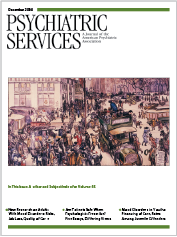Ward Just, a veteran writer with 14 novels and numerous awards to his credit, has created in An Unfinished Season a coming-of-age story set in Chicago in the 1950s. World War II is over, but its shadow lingers. Wils Ravan lives in an affluent suburb on the western edge of Chicago's growing suburbia, and we follow his progress through that never-never land that divides life at home from the trip to college.
Ravan's father, initially drawn as a figure of power and awe, faces a strike at his factory and the extended departure of his wife. Wils splits his time between a gofer job at a downtown newspaper and the socialite parties of the Lakefront North Shore, finds his first true love, Aurora, and … The book is worth reading, so I won't spoil it.
The readership of Psychiatric Services will be particularly interested in the character of Jason Brule, Aurora's father. A psychiatrist mysteriously known to everyone in Chicago society, he drifts in the shadows of the summer balls—aloof, seemingly detached, but somehow known and in the know. It is Dr. Brule's wartime experience, as an army medic who endured the unendurable during the Battan Death March, that haunts him and that in turn haunts the entire novel.
We see the social drama of the time—labor unrest, an economy in transition, the hesitant ease of the upwardly mobile—through the experiences of Wils the reporter, Wils the child of privilege, and Wils' father, a factory owner rocked by union violence. The hum of tension is what elevates this novel beyond the clichés of "going off to college" and gives it its interest. There is not only the tension of life in transition through adolescence but also the tension between postwar ease and the lingering impact of the war, between prosperity and social change.
The most nuanced aspect of An Unfinished Season, for me, has to do with Wils' dawning appreciation of adults as complex, three-dimensional figures. This evolving appreciation is carefully observed, well crafted, and particularly powerful. I would not hold the book up as great literature. Nor is the attention paid to psychiatry so central that it becomes a must read for psychiatrists. But An Unfinished Season is an enjoyable and interesting novel, well worth the time. Those who know and love Chicago, and anyone interested in the social issues of post-World War II America, should make a particular effort to track this one down.

